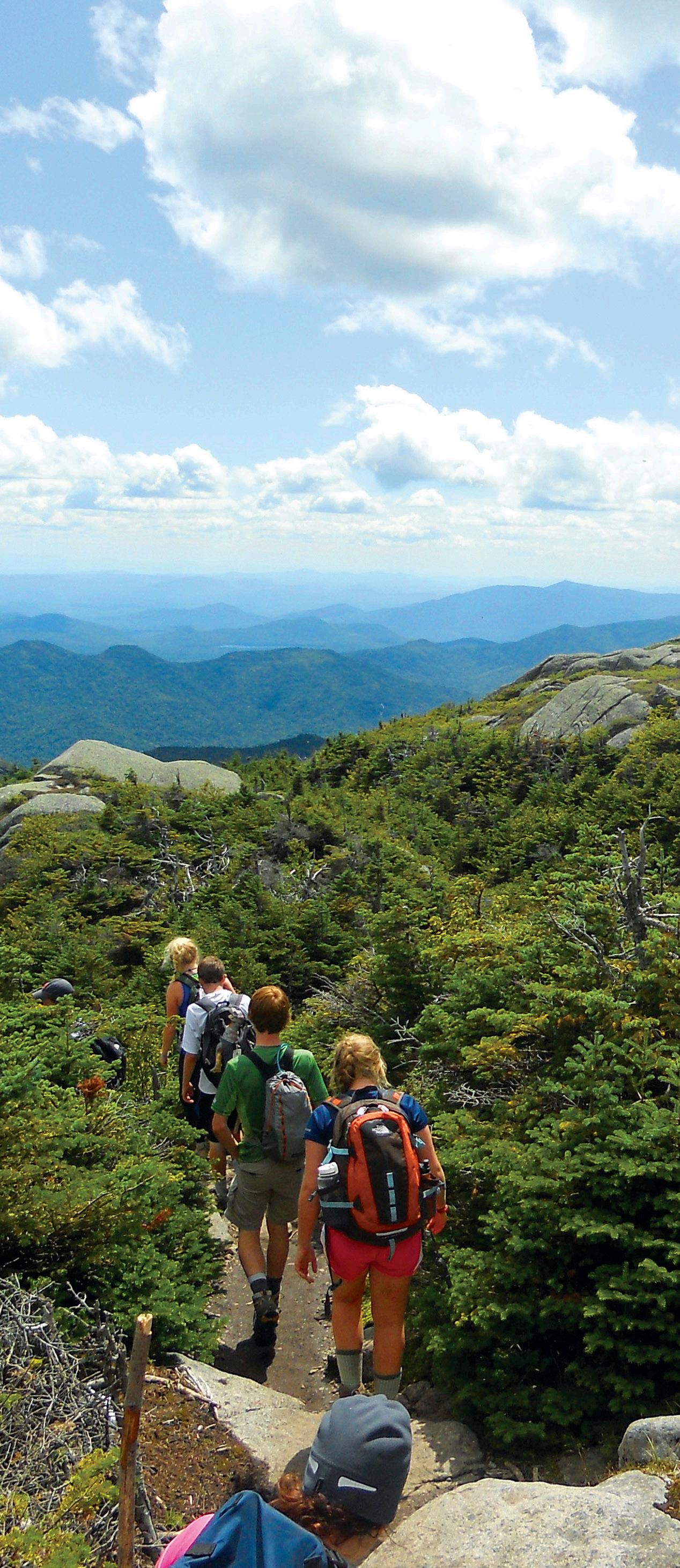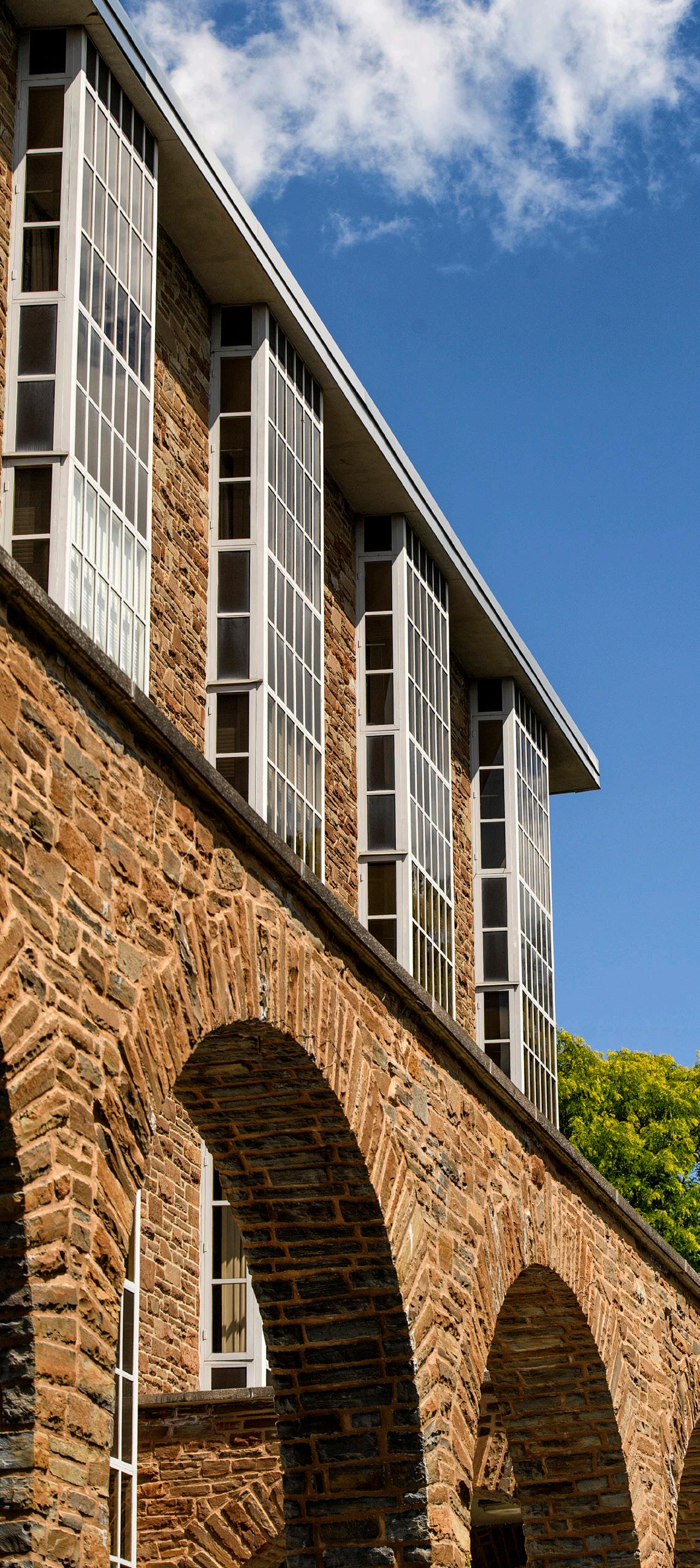
9 minute read
A. A Culture of Sustainability Across Campus (cont.) ACTIONS TO
Topical Area Identified Needs
Student Orientation and Training
Formal student education and outreach about how to participate in sustainability practices, including recycling, composting, food systems, carbon neutrality goal, and electric vehicles.
2023-25 Actions
• Sustainability Office and HSC will work with the assistant dean of students for student engagement and the Orientation Committee to develop and incorporate new student orientation around sustainability starting in Fall 2023.
• Sustainability Office and HSC will work with the director of residential life on residential educational programming for first-year residence halls about sustainability.
New Employee and Faculty Orientation
Formal employee and faculty education and outreach about sustainability practices, including recycling, composting, food systems, carbon neutrality goal, and electric vehicles.
• Sustainability Office and HSC will work with Human Resources to develop and incorporate new employee education around sustainability starting Jan. 1, 2024.
• Sustainability Office, HSC, and Environmental Studies Program will work with new faculty orientation organizers to incorporate sustainability education starting Fall 2023.
Admission Engagement
Raise sustainability profile during Admission tours. By making the College’s steps toward increased sustainability a consistent and coordinated part of communication to visitors, we both increase awareness about sustainability efforts on campus and target environmentally motivated applicants.
Sustainability Office and HSC, along with the Environmental Studies Program, will work with Admission and Communications and Marketing to streamline communication of sustainability goals, assets, and activities as part of Admission tours and outreach.
2026-30 Actions
Sustainability Office and HSC will work with First-Year Experience to review effectiveness of sustainability orientation programming.
Sustainability Office and HSC will work with Human Resources and Environmental Studies Program to review effectiveness of sustainability orientation programming for employees and faculty.
• Establish regular reviews of sustainability communication with prospective students.
• Sustainability Office and HSC will work with Admission to survey prospective and admitted students about their exposure to Hamilton’s sustainability goals.
Topical Area Identified Needs
Regular Campus Community Engagement on Sustainability
A formalized structure for engaging ongoing but sporadic and uncoordinated sustainability events on campus. Overlooked areas to be included in our efforts include Wellness programming, the Arboretum, Athletics, and LITS.
2023-25 Actions
Establish regular (1x per month) campus sustainability tours, in which all members of the Hamilton community are invited to tour a dimension of campus sustainability (reforestation, EV chargers, geothermal system, recycling guide, food systems, etc.).
Regular Campus Sustainability Communication
Regular and coordinated updating of the Sustainability Working Group website to keep up with current efforts and provide relevant information to the community.
• Establish regular (1x per month) campus sustainability updates, FAQs, and event announcements in an all-campus email coordinated between the Communications and Marketing Office and the Office of Sustainability.
• Establish responsibility for regularly updating the Sustainability and Sustainability Working Group websites.
2026-30 Actions
Study the potential for a proposal for formal selfreporting of activities to advance sustainability on campus for all employees.
Continue to assess communication tactics and outcomes and adjust efforts as needed.
Sustainability Personnel Assess the bandwidth of the Sustainability Office. The office that manages campus sustainability is also responsible for environmental protection and safety.
Complete a staffing analysis against peer schools to illustrate how Hamilton’s model compares. Consider reorganization of existing staff or whether a new FTE would be necessary to achieve the culture we are striving for.
Continue to assess the staff resources in relation to sustainability efforts. Additional staff may be required as the plan matures and grows.
B. Sustainability Across the Curriculum
For Sustainability Across The Curriculum
Sustainability In The Formal Curriculum
All members of the Hamilton community are encouraged to develop and have access to the knowledge, skills, and understanding of the causes and consequences of, as well as potential solutions to, the world’s pressing environmental challenges. We seek to enable members of the community to become environmentally conscious citizens of the world.
Sustainability topics arise in courses throughout the Hamilton curriculum, and students in concentrations across the arts, sciences, social sciences, and humanities address sustainability challenges in their coursework and senior projects.
The interdisciplinary Environmental Studies Program functions as a keystone for studying sustainability topics at Hamilton, and many students with an interest in sustainability challenges take courses in, concentrate, or minor in Environmental Studies. The curricular goals of the Environmental Studies Program focus on training students to be environmentally conscious:
The goals of the Hamilton College Environmental Studies Program are to provide students with the knowledge, skills, and interdisciplinary perspectives to understand the causes and consequences of, as well as potential solutions to, the world’s pressing environmental challenges, and to enable them to become environmentally conscious citizens.
The Environmental Studies concentration requires courses on climate change, environmental justice, environmental data science, as well as courses in environmental science, the environmental social sciences, and environmental humanities. Environmental Studies senior projects frequently focus on sustainability.
Within Hamilton’s open curriculum, students are required to complete three writing-intensive courses, a quantitative and symbolic reasoning course, and a departmental course addressing social structural and institutional hierarchies. Currently there are no requirements for students to take courses that discuss sustainability topics.
Outside of the formal curriculum, many organizations and centers on campus participate in providing programming and experiential learning opportunities around sustainability topics outside of the formal curriculum. These include:
AQUAPONICS: Hamilton Aquaponics aims to educate the community about the benefits of aquaponics technologies by providing hands-on experience with a working aquaponics operation. Some of the activities include caring for fish and vegetable stocks, testing water parameters, maintaining the aquaponics system, and building new features. The group aims to grow produce and/or fish for the school and local food kitchens.
CLIMATE JUSTICE COALITION: The Climate Justice Coalition is dedicated to advocating for climate justice, sustainable practices, and increased climate-related education at Hamilton and in Oneida County.
COMMUNITY GARDEN: The community garden provides a space for employees and students to grow vegetables and flowers in a cooperative setting.
COMMUNITY OUTREACH & OPPORTUNITY
PROJECT (COOP): The COOP offers community service opportunities, connecting Hamilton students and employees with Oneida County nonprofit agencies. These opportunities create positive change for community partners as well as educational experiences for students.
• AXB: AXB, formerly known as Alternative Spring Break, offers student-planned, organized, and led community service trips over Hamilton’s October, January, and March breaks. Recent trips have ventured to local Pathfinder Village, assisted in hurricane relief in North Carolina, and worked with community betterment programs in Baltimore.
• THE HARVEST: The Harvest is a food recovery initiative where students package leftovers from Hamilton’s dining halls, and that food is given to organizations in the greater Utica community.
B. Sustainability Across the Curriculum (cont.)
DAYS-MASSOLO CENTER: The Days-Massolo Center facilitates student community organizing, leads in inclusive educational initiatives, and amplifies the marginalized voices of those striving to make the Hamilton experience more equitable. The center works collaboratively with campus partners and community organizations to sponsor educational and cultural programs, to foster connections, and to create opportunities for difficult conversations.
FEMINISTS OF COLOR COLLECTIVE: The main focus of the Feminists of Color Collective is to disrupt colonial, patriarchal, and capitalist spaces through dialogue and artistic outlets. Students explore the intersectionality of race, gender, class, and sexuality. The collective is a space that caters specifically to the of-color experiences on campus and in the world at large, aiming to foster an empowered community among individuals of such intersecting identities grounded in artistry, vulnerability, and companionship.
GREEN WEEK: A week that highlights sustainability efforts on campus and encourages community involvement via such activities as a farmer’s market, bring-your-own-mug day, an electric car show, and an upcycling activity.
GREEN OFFICE AMBASSADORS: The Green Office Ambassadors is a network of individuals interested in implementing sustainable practices within their own office, departments, and across campus. The program connects staff members with sustainability resources and develops ideas to improve campuswide engagement.
GUEST SPEAKERS AND LECTURERS: Hamilton is committed to enhancing the academic experience of its students by introducing them to a wide array of intellectually challenging speakers.
HAMILTON SUSTAINABILITY COORDINATORS (HSC): The Hamilton Sustainability Coordinators are students working for the Sustainability Office to plan and implement sustainability initiatives undertaken by the College, particularly those that are student-facing. They also represent a bridge between the student body and their elected representatives on Student Assembly.

LEVITT CENTER: At the Levitt Center, students combine academic knowledge with practical skills as they engage in public affairs through research, service-learning, lectures, discussion, and practice.
OUTDOOR LEADERSHIP PROGRAM: The Outdoor Leadership Program encourages students to explore the outdoors and grow as leaders in an outdoor setting by participating in outdoor recreation.

• HOC: The Hamilton Outing Club promotes awareness of and appreciation for the wilderness that surrounds campus by making the outdoors more accessible to the community.
PLANTS @ HAMILTON: Plants @ Hamilton provides a space for lovers of all flora, whether their interests lie in botany, horticulture, farming, other plant sciences, and even the simple mission of keeping one plant alive.
Residential Life Special Interest
COMMUNITY: A Special Interest Community is a group of students who choose to live together based on a shared interest in a specific topic. This group, with the support of Residential Life and an advisor, sets goals and works toward achieving them through shared experiences and community building.
SLOW FOOD: “Slow” food is the opposite of fast food. With chapters all over the world, Slow Food is an international organization that supports food that is good (healthy and delicious), clean (for animals and the environment), and fair (for workers and producers). Slow Food Hamilton College believes food is a vehicle for social change. It works together to build power in the movement to transform food and farming by organizing events and projects that both celebrate and support slow food.
SUMMER SUSTAINABILITY INTERNSHIPS: The Sustainability Office hires several students each summer to both advance Hamilton’s sustainability initiatives and provide experiential opportunities to inform/enhance participants’ future career interests.
B. Sustainability Across the Curriculum (cont.)
Topical Area Identified Needs
Formal Curriculum Need formal documentation of the ways in which sustainability is currently taught across the curriculum. Documenting “sustainability” courses is needed for AASHE STARS and would help inform curricular decisions.
2023-25 Actions
• Survey campus departments about ways in which sustainability topics are addressed in their courses.
• Develop a list of courses that focus on sustainability for AASHE.
• Survey students about interest in sustainability topics in curriculum.
• Ask Institutional Research what percentage of students take an ENVST course.
2026-30 Actions
Initiate faculty conversations about collegewide sustainability learning objectives or Course Catalogue indicators for sustainability courses.
Coordination There is much sustainability programming at Hamilton, but it lacks coordination and is largely ad hoc.
• Coordinate identifying and branding sustainability events when they occur through the Sustainability Office, HSC, Environmental Studies Program, Levitt Center, student organizations, Days-Massolo Center, Glen House, Chaplaincy, and academic departments/ programs.
• Start with labeling events as “Sustainability” and expand from Green Week coordination to the entire year. student groups, HOC, Levitt Center, Chaplaincy, academic departments/programs, and DMC can regularly be invited to planning meetings before each semester.
Establish a campus Sustainability Council that meets several times a semester to coordinate programming and events.
Topical Area Identified Needs
Programming Need dedicated resources for student-led sustainability initiatives, sustainability programming, and student research on sustainability projects.
2023-25 Actions
Sustainability Office and HSC and the Environmental Studies Program can work with Advancement and the Dean of Faculty Office to explore opportunities for supporting additional student research and student initiatives around sustainability.
2026-30 Actions
Establish dedicated fund to support student sustainability initiatives.
Experiential Education Need to expand on- and off-campus opportunities, engaged courses that focus on sustainability practices, and learning through hands-on work.
Sustainability Office, HSC, COOP, and the Environmental Studies Program can work with Engaged Education, ALEX, and Experiential Education to create more on- and off-campus opportunities for student research and community improvement projects.
Sustainability Council will continue to work with Engaged Education, ALEX, and Experiential Education to create more on- and off-campus opportunities for student research and community improvement projects.
C. Buildings, Energy, and Transportation Management

Hamilton’s vision for sustainably managing its campus buildings, energy, and transportation systems couples minimizing carbon and ecological impact with maximally leveraged technology innovations through the capital planning and renovation process.
As we face the pressing issue of climate change, it is more important than ever for Hamilton to take a leadership role in advancing a culture of sustainability. We have the unique ability to set an example for the wider community by implementing environmentally conscious practices to manage our facilities, energy use, and vehicle fleet. By embracing green building principles and promoting energy conservation, Hamilton can significantly reduce its carbon footprint. Furthermore, by encouraging the use of electric and hybrid vehicles for its fleet, and promoting alternative forms of transportation, our campus can also make a meaningful impact on reducing carbon emissions. By taking these steps, Hamilton not only serves as a model for sustainability, but also plays a vital role in educating and preparing the next generation of leaders to tackle the pressing environmental challenges of our time.




